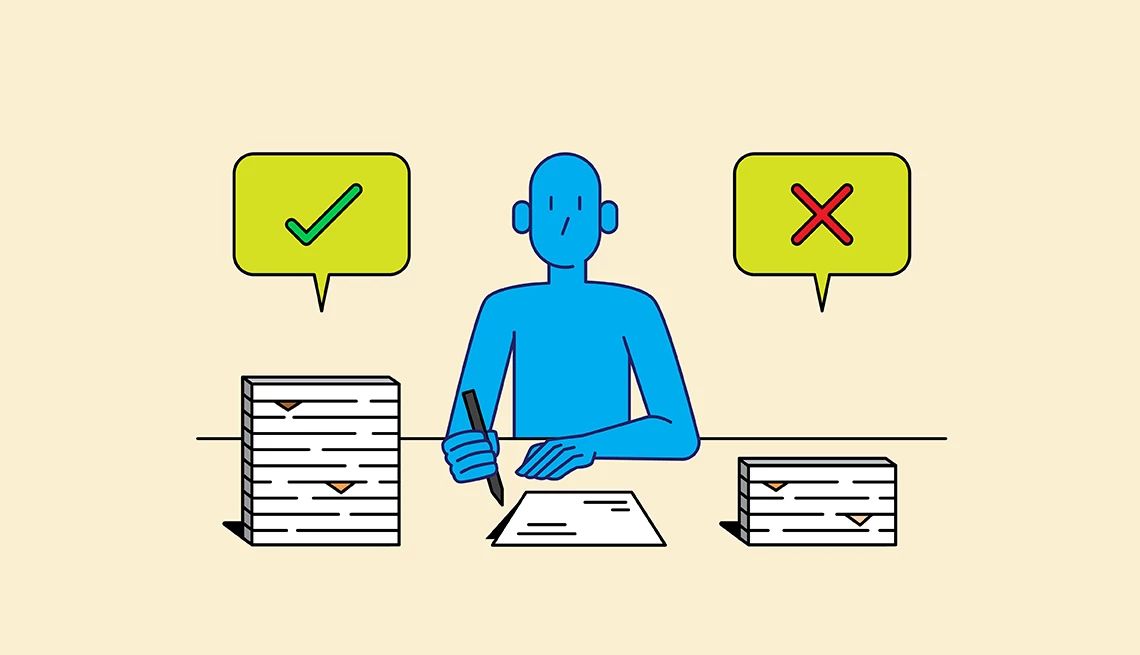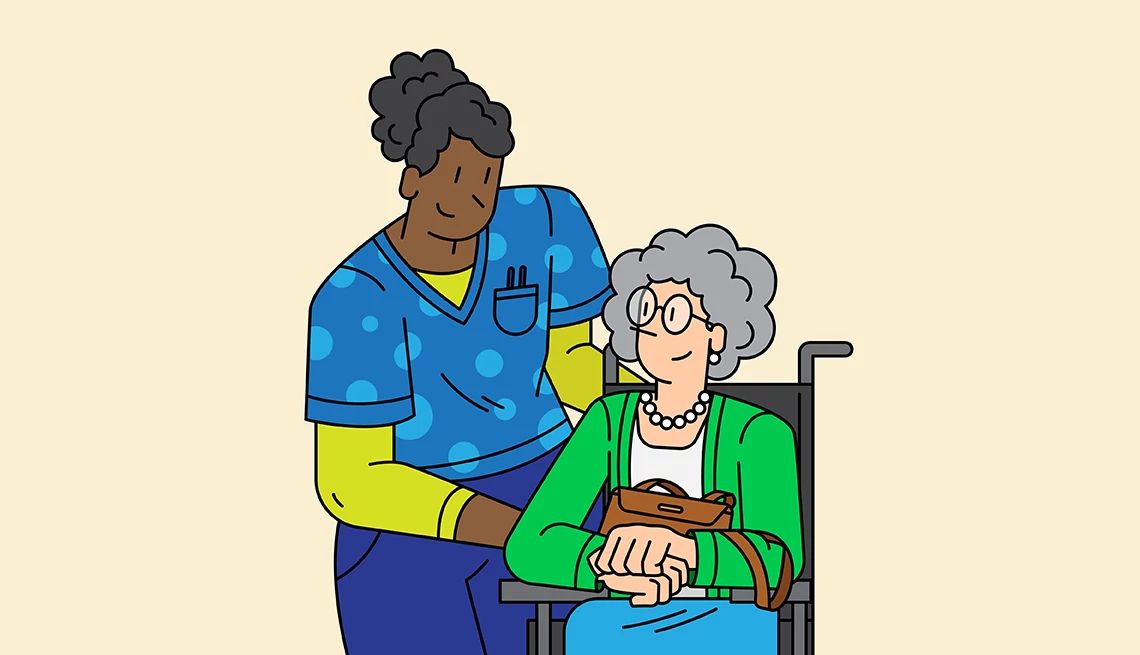AARP Hearing Center


It’s not your imagination. Getting older really does come with more aches, more checkups and, yes, more medical bills.
More than 1 in 4 U.S. adults ages 40 to 64 are in medical debt, with most owing between $1,000 and $1,999 (22 percent) or $2,000 and $4,999 (23 percent), a 2024 AARP survey found.
Among adults 65 and older who report being behind on medical bills, the average balance is an estimated $13,800, a 2023 Consumer Financial Protection Bureau analysis of Census Bureau data found. And not all of those bills are from expensive hospital stays and surgeries: A large share of older adults with medical debt attribute some of it to routine services such as lab fees and diagnostic tests, according to KFF, a nonpartisan health policy nonprofit.
Even a healthy 65-year-old who retired in 2024 faces anywhere from $128,000 to $320,000 in lifetime out-of-pocket medical costs, according to research firm Milliman.
But don’t panic. There are steps you can take to cut through medical expenses without sacrificing the quality of your health care or dipping into your retirement savings to pay a sky-high bill. Here are 25 ways to save on prescriptions, negotiate hospital bills and clamp down on other medical expenses.
1. Don’t miss out on free medical exams
One often overlooked health care benefit? Medicare Part B and most Medicare Advantage plans offer a wide range of preventive services at no cost, such as annual wellness visits, cognitive screenings, mammograms, colonoscopies, bone density scans, skin cancer checks and recommended vaccines like flu, pneumonia and shingles. “These visits go beyond check-the-box appointments,” says journalist Dan Weissmann, creator of An Arm and a Leg, a podcast about the cost of health care. “They’re a chance to catch silent problems early, when treatment is simpler and much less expensive.”
Some Medicare Advantage plans even reward you for getting free medical exams and screenings by lowering your plan’s premiums. Yet millions leave these benefits on the table: In 2022, about 40 percent of eligible policyholders failed to take advantage of their free wellness visit, according to the Centers for Medicare & Medicaid Services.
2. Correct your hearing today so you’re not paying for memory care tomorrow
“There’s a clear link between hearing loss and dementia, yet too many older people resist hearing aids,” says Carolyn Rosenblatt, a registered nurse, elder law attorney and founder of AgingParents.com, a website that addresses legal and health care issues around aging in place. A 2023 study led by researchers at Johns Hopkins showed moderate to severe hearing loss raises dementia prevalence by 61 percent. Wearing hearing aids reduces that risk by a third.
When shopping for hearing aids, consider Costco, Walmart, CVS and direct-to-consumer online outlets like Beltone, Miracle-Ear and FitHearing. These retailers typically undercut the national average prices for prescription devices — currently around $3,300 per pair — and often throw in service perks like free fittings.
3. On a high-deductible plan? Ask for a medical provider’s cash price first
If you have a high-deductible health insurance plan and don’t typically reach your annual out-of-pocket maximum, you could save money by paying for medical appointments and treatments with cash instead of going through insurance. “The cash price for a medical procedure is [often] lower than the insurer’s” price, says Bai. “If you’re never hitting the deductible, cash is often smarter.”
Her research team at Johns Hopkins analyzed 70 common services at hospitals countrywide and found that the self-pay price was lower than the negotiated insurance price nearly half of the time. That’s because some hospitals offer steep discounts to patients who pay up front. Bai’s advice: Ask health care providers, “What’s the price if I pay in full today, without going through insurance, versus the insurance price?”
4. Get help from an unbiased expert when comparing Medicare plans
With so many options and so many rules, choosing a Medicare plan can be overwhelming, which is why many people go through a broker. “The trouble is, brokers often try to upsell” clients because they work on commission, warns Phil Moeller, author of Get What’s Yours for Medicare: Maximize Your Coverage, Minimize Your Costs. He recommends getting free advice from an independent Medicare expert instead of using a broker.
Every state offers trained Medicare plan counselors through the State Health Insurance Assistance Program (SHIP). These experts can help you compare policies and determine the right plan for you at no cost. “Their job is to give you the best possible information to make a smart choice,” Moeller says. That could mean finding a cheaper plan, flagging Medicare Savings Programs or Extra Help programs you didn’t know you qualified for, or steering you away from options that cost more but offer less coverage. You can find your local SHIP at shiphelp.org or by calling 877-839-2675.


5. Use AI tools to check medical bills for errors
Quick! What’s the difference between billing codes 99213 and J1885? Perplexed? You’re not alone. Up to 80 percent of medical bills contain errors, and many are buried in language that’s difficult to decipher. Moreover, a 2024 federal audit of Medicare Advantage health plans revealed billions of dollars in overcharges and other payment errors.
Older adults are especially vulnerable to medical billing errors. With more chronic conditions and more frequent medical care, they face a greater chance of incorrect charges, according to the Consumer Financial Protection Bureau.
But there’s a secret weapon: Artificial intelligence tools like ChatGPT, Microsoft Copilot and Google Gemini can translate itemized bills into plain English and flag duplicate or incorrect charges. Use your smartphone to take a picture of the bill (after blacking out your name, birth date, Social Security number and any other identifying details for security protection), upload it to one of the AI tools and ask, “Can you explain these charges? Do any of them look unusual or incorrect?”
“If AI says something looks wrong, call the billing office and ask them to explain or correct it,” says Ge Bai, a professor at Johns Hopkins who studies health policy and hospital billing. “That can easily save you $50, $100 or much more.”
Emerging online tools like OpenHand use AI to catch billing errors and can even help patients negotiate with health care providers — so it’s worth watching where this technology leads.
6. Protect yourself when you check in for an appointment
When you arrive at a hospital or doctor’s office, you’re often handed a tablet and asked to sign lengthy consent forms. But what exactly are you agreeing to? “Ask them to print out the paperwork,” Weissmann says. Buried in those consent forms could be a waiver that authorizes the provider to bill you at full out-of-network rates even if the provider is in-network, bypassing your “No Surprises Act” protections.
Watch out for language like, “If you sign this form, you agree to give up your protections under the law.” If you see that or anything mentioning that you’re “waiving” rights or agreeing to out-of-network charges, don’t sign, Weissmann says.
However, if you are set on seeing that specific doctor or hospital, he recommends a tactic from health care journalist Marshall Allen: Cross out the “consent to treat” waiver and write, “I will pay as much as two times what Medicare would pay for this.” Then, initial the change and keep a copy for your records. Most front-desk staff will shrug and accept it without question, Weissmann says, placing a cap on how much the provider can charge you.




































































You Might Also Like
How Does Grief Affect Your Health?
A doctor explains what grief does to your body and how to begin healing from complicated grief
Medical Mystery: Doctors Told Him to Stop Drinking. He Swore He Wasn’t
For years, Scott Evenson was called an alcoholic, but the true cause of his intoxication was shockingSmart Guide to Vaccines for Adults Over 50
A comprehensive guide to vaccines and their benefits